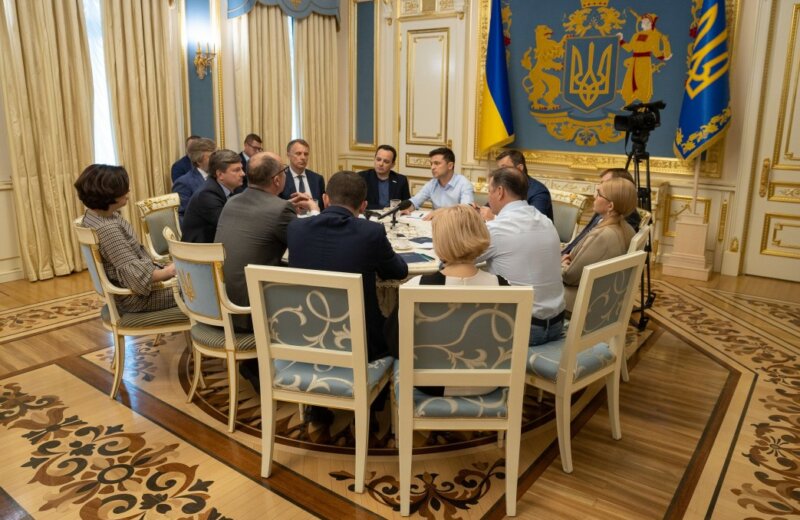Ukrainian President Volodymyr Zelenskiy has officially dissolved the parliament, or Verkhovna Rada, and scheduled snap elections for July 21. The decree was published on the president’s website on May 21 following talks with the leaders of all parliamentary factions.
Zelenskiy also asked the speaker of the parliament, Andriy Parubiy, to convene a parliamentary session on May 22 to pass amendments to the electoral law, one of which will abolish single-member districts.
Legitimacy of dissolution
After a three-hour meeting with Zelenskiy at the presidential administration on May 21, the majority of the parliamentary factions accepted the president’s decision to hold the election early instead of on the original date of Oct. 27.
“The main argument for dissolving this parliament is the very low level of trust that people have in it. It stands at just 4 percent,” Zelenskiy was quoted as saying by his press service.
Zelenskiy said that the legal reason for dissolving the parliament was the fact that “there hasn’t been a coalition since 2016.”
Since the break-up of a broader coalition in 2016, the parliament has been led by a two-party coalition of the Petro Poroshenko Bloc and People’s Front. However, this coalition appears not to legally exist. Despite many requests from the media, the parliament has never published the coalition agreement or a list of the coalition’s members, leading to speculation that it didn’t have the necessary 226 lawmakers.
However, the parliamentary factions remain divided on whether the decision to dissolve parliament was legitimate. Some deemed it unconstitutional but accepted it anyway, such as Poroshenko’s Bloc.
Yulia Tymoshenko, head of the 20-member Batkivshchyna party faction, backed the dissolution of parliament and claimed it was “entirely legal” because the parliament hadn’t had a real coalition since March 2016.
When asked why the parliament kept working if the coalition hadn’t existed since 2016, Tymoshenko had a simple response.
“No one is immune to violating the Constitution,” she said.
Tymoshenko, who won 13 percent of the vote in the first round of the presidential election on March 31, hopes to grow her party’s representation in the parliament in the new election.
The only party against the snap election is the People’s Front, the parliament’s second-largest faction with 80 members. The party — associated with ex-Prime Minister Arseniy Yatsenyuk and long-standing and influential Interior Minister Arsen Avakov — emerged as the top winner of the 2014 parliamentary election, but has since seen its approval ratings sink. Today, it is the party least prepared for the election: it is expected to re-brand or split into different parties.
In a survey by three pollsters — Social Monitoring, Rating, and the Ukrainian Institute of Sociological Research — released on May 16, Zelenskiy’s political party, Servant of the People, received 39.9 percent support from respondents who have made up their mind on a party. Russia-friendly consortium Opposition Platform — Za Zhittya took second with 10.9 percent. Petro Poroshenko Bloc got 10.9 percent. Yulia Tymoshenko’s Batkivshchyna took 9.1 percent.
Changes to the electoral law
Zelenskiy wants to have the new parliament elected by new rules.
Changing the electoral legislation has also been a major demand by opposition parties in parliament and by democratic politicians outside it.
According to Zelenskiy’s legal adviser Andriy Bohdan, Zelenskiy is pushing for the cancellation of single-member districts, which will require candidates to run only on a party list. He also supports lowering the threshold for parties to get into parliament from 5 percent to 3 percent of the vote. Another important change he wants is to decrease the time frame for public procurements carried out by the Central Election Commission while holding an election.
However, Bohdan didn’t mention the other key change many have anticipated: open party lists, which would give people more control over exactly who they vote for and thus end the corrupt practice of parties selling spots on their lists.
Zelenskiy demanded the introduction of open party lists in his inauguration speech a day earlier. But on May 21, it was notably missing from his adviser’s list of demands.



